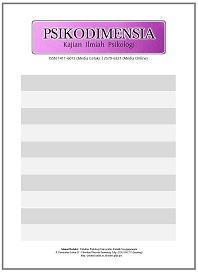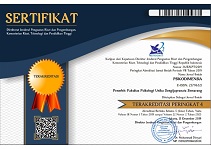The Relationship Between Self Control With Intensity of Playing Online Games on The School Children
Abstract
Keywords
Full Text:
PDFReferences
Asosiasi Penyelenggara Jasa Internet Indonesia. (2015). Profil Pengguna Internet Indonesia 2014. Jakarta: Pusat Kajian Komunikasi Universitas Indonesia.
Azwar, S. (2017). Penyusunan skala psikologi, Edisi 2. Yogyakarta: Pustaka Pelajar.
Budhi, F. H.,& Endang, S., I. (2016). Hubungan antara kontrol diri dengan intensitas bermain game online pada mahasiswa pemain game online di game centre X semarang. Jurnal Empati. 5, (3). Agustus 2016. 478 – 481.
Chen, C. Y., & Chang, S. L. (2008). An exploration of the tendency to online game addiction due to user’s liking of design features. Asian Journal of Health and Information Sciences. 03, (1-4), pp. 38-51, 2008.
Dewandari, S. (2013). Hubungan antara intensitas bermain game online dengan motivasi belajar siswa kelas X SMK Negeri 1 Sarupan Kabupaten Wonosobo. Skripsi, Fakultas Keguruan dan Ilmu Pendidikan, Universitas Kristen Satya Wacana.
Ghufron, M. N., & Risnawita, R. S. (2010). Teori-teori psikologi. Jogjakarta: Ar-ruzz Media.
Herudin. (2014, January 31th). http://www.tribunnews.com/iptek/2014/01/31/ada-25-juta-orang-indonesia-doyan-main-game-online. (diakses pada tanggal 6 Januari 2018).
Hurlock, E. B. (2008). Perkembangan anak jilid 2. Jakarta: Erlangga.
Ismail, A.B., & Zawahreh, N. (2017). Self controland its relationship with the internet addiction among a sample of Najran University Students.Journal of Education and Human Development. 06, (02). 186 – 174.
Kim, E. J., Ku,T., dan Namkoong, S. J. (2008). The relationship between online game addiction and aggression, self control and narcissistic personality traits. European Psychiatry. 23, (212 – 218).
Lemmens, J. S., dkk. (2009). Development and validation of a game addiction scale for adolescents. Media Psychology. The Amsterdam School of Communication Research (ASCoR), University of Amsterdam, Amsterdam, The Netherlands. Version of Record first Publish: 5 Maret 2009.
Masya, H., & Candra, D.A. (2016). Faktor-faktor yang mempengaruhi perilaku gangguan kecanduan game online pada peserta didik kelas X madrasah aliyah Al Furqon Prabumulih tahun pelajaran 2015/2016. Jurnal Bimbingan dan Konseling, 03, (1) , 153-169.
Maulana, R. (2017, February 27th). https://id.techinasia.com/perkembangan-pasar-game-indonesia-salah-satu-yang-tertinggi-di-2016.(diakses pada tanggal 7 Januari 2018).
Meggit, C. (2013). Memahami perkembangan anak. Jakarta: PT Indeks.
Mehroof, M., & Griffith, M, D. (2010). Online gaming addiction: The role of sensation seeking, Self control, Neuroticism, Aggression, State anxiety, And trait anxiety. Journal Cyberpsychology, Behavior, and Social Networking. 13, (3), 2010.
Ningtyas, S. D. Y. (2012). Hubungan antara self control dengan internet addiction pada mahasiswa. Eductional Psychology Journal. EJP 1, (1), (2012).
Nuhan, M. Y. G. (2016). Hubungan intensitas bermain game onlinedengan prestasi belajar siswa kelas IV sekolah dasar negeri Jarakan Kabupaten Bantul Yogyakarta. Jurnal Pendidikan Guru Sekolah Dasar, Edisi 6 Tahun ke-5, 2016.
Pertiwi, I. (2016, October 27th). https://www.rappler.com/Indonesia/ berita/ 150478-pengguna-internet-indonesia. (diakses pada tanggal 5 Februari 2016).
Santrock, J.W. (2012). Life span development. Jakarta: Erlangga.
Soetjiningsih, C. H. (2012). Perkembangan anak sejak pertumbuhan sampai dengan kanak-kanak akhir. Jakarta: Prenada Media group
Sugiyono. (2014). Statistika untuk penelitian. Bandung: Alfabeta.
Tangney, J. P., Roy, F. B., & Angie, L. B. (2004). High self-control predicts good adjustment, Less pathology, Better grades, And interpersonal success. Journal of Personality. 72, (2).
Teng, Z., Yujie, L., & Yanling, L. (2014). Onlinegaming, internet addiction, And aggression of Chinese male sudents: The mediating role of low self-control. International Journal of Psychological Studies. 6, (2).
Ursia, N.R., Ide, B.S., & Nadia, S. (2013). Prokrastinasi akademik dan self-control pada mahasiswa skripsi Fakultas Psikologi Universitas Surabaya. Makara Seri Sosial Humaiora. 17, (1), 1 – 18.
Young, K. S. (2009). Understanding onlinegaming addiction and treatment issues for adolescents. The American Journal of Family Therapy. 355 – 372.
Zulkarnain. (2002). Hubungan kontrol diri dengan kreativitas pekerja. USU Digilib: Universitas Sumatera Utara.
DOI: https://doi.org/10.24167/psidim.v17i2.1636
Print ISSN : 1411-6073 | online ISSN : 2579-6321 View My Stats

This work is licensed under a Creative Commons Attribution 4.0 International License.




















